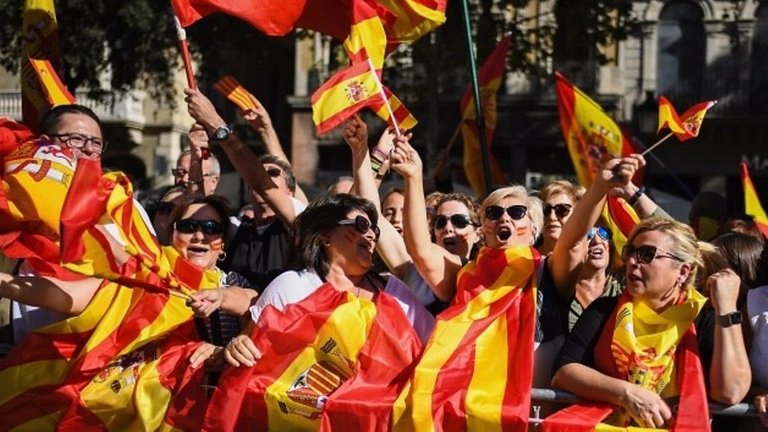 Spain's foreign minister has repeated his government's position that the sacked Catalan leader could run in new elections in December, but stressed that meant only if he was not in jail.
Spain's foreign minister has repeated his government's position that the sacked Catalan leader could run in new elections in December, but stressed that meant only if he was not in jail.
Alfonso Dastis spoke as a huge rally for Spanish unity was held in Catalonia's largest city, Barcelona.
Carles Puigdemont was removed from office after Madrid stripped Catalonia of autonomy for declaring independence.
Spain's central government has now taken control of Catalan institutions.
Spain's chief prosecutor is preparing to file criminal charges against Mr Puigdemont and other Catalan officials for breaching Spanish law.
This could possibly happen as soon as Monday, the first working day since the independence declaration and the Spanish counter-measures.
Mr Puigdemont has said he does not recognise the order from Madrid removing him from power.
Madrid's enforcer for Catalonia
What next for Spain?
Mr Dastis told Sky News: "We are not taking autonomy away from Catalonia. We are just re-establishing it, in fact."
He added: "Reality is already sinking in, will continue sinking in and they will realise that they cannot do something without the authority of law and they will be usurping authority."
Image copyright EPA Sacked Catalan leader Carles Puigdemont greets supporters at the entrance of a restaurant in Girona, 28 October 2017
Image caption Mr Puigdemont has urged "democratic opposition" to direct rule from Madrid
Meanwhile, Interior Minister Juan Ignacio Zoido has written to all police officers in Catalonia asking for their loyalty as a "new era" begins in the region.
He reminded members of the regional police, who are now under direct control from Madrid, of their duty to obey orders and to guarantee "the rights and liberties of all".
The BBC's Sarah Rainsford, in Madrid, says arresting Mr Puigdemont is likely to spark protests - and is perhaps one of the reasons why the interior minister has written this letter.
Senior police officers have told the BBC that they have already complied with an order to remove framed photographs of the sacked leader from police stations across the region.
Rule from Madrid
Spain has been gripped by a constitutional crisis since a referendum, organised by Mr Puigdemont's separatist government, was held earlier this month in defiance of a ruling by the Constitutional Court which had declared it illegal.
The Catalan government said that of the 43% of potential voters who took part, 90% were in favour of independence.
Friday saw the regional parliament declare independence, with Madrid responding by declaring the move illegal.
Prime Minister Mariano Rajoy then announced the dissolution of the regional parliament and the removal of Mr Puigdemont as Catalan leader, and ordered that fresh elections should be held on 21 December.
What powers has Catalonia now lost?
The case for and against independence
Mr Puigdemont has urged "democratic opposition" to direct rule from Madrid.
Flags in Catalonia and what they mean
Image caption Flags in Catalonia and what they mean
Belgium's Migration Minister Theo Francken has said the separatist leader could be given asylum protection which Spain would find difficult to reverse.
"If you see the situation at the moment, the prison sentences and the repression from Madrid and the prison sentences that are bandied about... the question is obviously whether somebody like that has the chance of a fair trial," he told Reuters.
There is no suggestion that Mr Puigdemont is seeking to leave Catalonia.
He had been expected to attend a football match in Girona, the heartland of the pro-independence movement, which saw the local team beat Real Madrid - who Mr Rajoy supports - by 2-1. But he apparently did not make an appearance.
Does Catalonia want to leave Spain?
Reality Check: Police violence in Catalonia
Before Madrid took over the Catalan government, the region had one of the greatest levels of self-government in Spain.
It has its own parliament, police force and public broadcaster, as well as a government and president, though those have now been dismissed.
Catalans had a range of powers in many policy areas from culture and environment to communications, transportation, commerce and public safety.
Not indicating that the content you copy/paste is not your original work could be seen as plagiarism.
Some tips to share content and add value:
Repeated plagiarized posts are considered spam. Spam is discouraged by the community, and may result in action from the cheetah bot.
Creative Commons: If you are posting content under a Creative Commons license, please attribute and link according to the specific license. If you are posting content under CC0 or Public Domain please consider noting that at the end of your post.
If you are actually the original author, please do reply to let us know!
Thank You!
Hi! I am a robot. I just upvoted you! I found similar content that readers might be interested in:
http://www.bbc.co.uk/news/world-europe-41798254